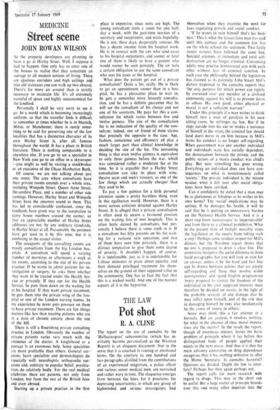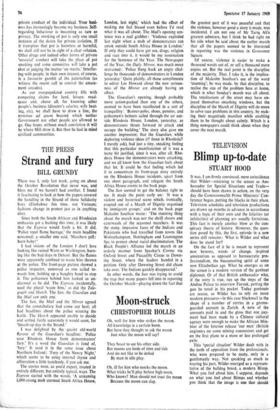Pot shot
THE LAW R. A. CLINE
The report on the use of cannabis by the 'Hallucinogens' subcommittee (which has in- evitably become personalised as the Wootton Report) is an eloquent document. Not in the sense that it is couched in rousing or emotional terms. On the contrary its one hundred and two paragraphs, distilled from the contributions of an experienced magistrate, a police officer and various senior medical men, are restrained and rather wary in tone. The eloquence emerges from between the lines, for it proclaims the depressing uncertainties in which any group of highminded and serious investigators find themselves When they examine the need for laws regulating private and social conduct.
'If he wants to ruin himself that's his busi- ness.' This is what the laissez-faire man has said until this century and the common law has on the whole echoed the sentiment. Two fairly recent statutes have followed the same line, Suicidal attempts at immediate and total self- destruction are no longer criminal. Consenting adults may practise homosexual acts with each other without fear of criminal sanction. In each case the philosophy behind the legislation has claimed as its paternity John Stuart Mill's dictum (repeated in the cannabis report) that
'the only purpose for which power can rightly by exercised over any member of a civilised community against his will is to prevent harm to others. His own good, either physical or moral, is not a sufficient warrant.'
Under this principle if a man wishes to drink himself into a state of paralysis in his own sitting room, he infringes no law. But if he
steps outside into his car or makes a nuisance of.himself in the street, the criminal law should
(and does) .move in on him because in Mill's terms his conduct is no longer self-regarding. When government was just another individual
and individuals were less socially dependent, the demarcation between .the private and the public sectors of a man's conduct was child's play. But now something has gone wrong. Everything an individual does can have con- sequences on what is monotonously called 'society.' The private individual is the minute, residue, what is left over after social obliga- tions have been satisfied.
Can it confidently be stated that a man may be as gluttonous or bibulous as he wishes in his own home? The 'social' implications may be serrous. If he damages his health, it will be said that he is putting an unnecessary burden on the National Health Service. And it is a short step from 'unnecessary to 'impermissible' and from there to a criminal prohibition. What in the present state of twilight morality stops . the legislature or the courts from taking such a step? Perhaps some residual respect for Mill's . dictum, but the Wootton report shows that no one is prepared to draw a clear line. The committee recognise the awful dilemma in three lucid paragraphs, but you will look in vain for an answer. unless it be 'no hard and fast line can be drawn between actions that are purely self-regarding and those that involve wider consequences' and (good English pragmatism) 'every proposal to restrict the freedom of the individual in his own supposed interests must therefore be decided on merits. in the light of - the probable severity of any damage that he may inflict upon himself, and of the risk that in damaging himself he may also involuntarily be the cause of injury to others.'
Some may think this a fair attempt at a formula. But on analysis it resolves nothing, for what in the absence of clear moral impera- tives are the merits? In the result the report, though of enormous interest, leaves the basic problem of principle where it lay before this distinguished body of people applied their minds to the next move. And thus it is that the main advisory committee on drug dependence recognises that it has nothing definitive to offer the Home Secretary. Is cannabis harmful? Opinions are divided. Ought the law to inter- fere? Perhaps but then again perhaps not. The report calls for more research with regard to drugs. This may in the short run be useful. But a huge matter of principle broods over this and many other inquiries into the private conduct of the individual. Your bad- ness has increasingly become my business. Self- regarding behaviour is becoming as rare as privacy. The smoking of pot is only one small instance of the desire for private isolation. If it transpires that pot is harmless or harmful, we shall still not be in sight of a clear solution. Other drugs and indeed other forms of private 'unsocial' conduct will take the place of pot smoking and some committee will take a pot shot at judging the matter 'on merits.' Interfer- ing with people, in their own interest, of course, is a favourite gambit of the paternalists (as witness the recent call to control the amuse- ment arcades).
As our overpopulated country fills with competing claims for land, leisure, road- space and, above all, for knowing ether people's business (director's salaries, wife beat- ing, etc), we shall have to draw a line, the terminus ad quem beyond which neither Government nor other people are allowed to go. One hopes without much conviction it will be where Mill drew it. But then he had in mind civilised communities.



































 Previous page
Previous page